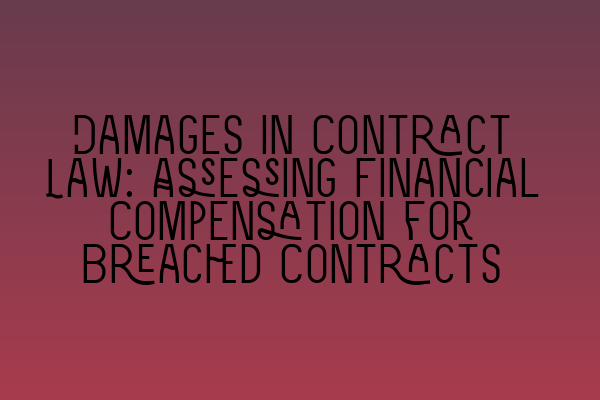Damages in Contract Law: Assessing Financial Compensation for Breached Contracts
Contracts are the backbone of any business transaction or legal agreement. They establish the rights and obligations of the parties involved and provide a framework for resolving disputes. However, not all contracts go as planned, and breaches can occur. When a contract is breached, the injured party may be entitled to financial compensation, known as damages.
In this article, we will explore the concept of damages in contract law and discuss how financial compensation is assessed in the event of a breached contract. We will examine the different types of damages, the principles governing their assessment, and the factors that influence the amount awarded.
Types of Damages
In contract law, there are several types of damages that may be awarded to the injured party:
- Compensatory Damages: Compensatory damages aim to put the injured party in the position they would have been in had the contract been performed as agreed. These damages typically take into account any financial loss suffered as a result of the breach, including lost profits, additional expenses, and loss of business opportunities.
- Consequential Damages: Consequential damages are a type of compensatory damages that go beyond the direct losses resulting from the breach. They include indirect or foreseeable losses that arise as a consequence of the breach and are often specific to the circumstances of each case.
- Punitive Damages: Punitive damages, also known as exemplary damages, are awarded in exceptional cases where the breaching party’s conduct was particularly egregious or reckless. They aim to punish the breaching party and deter similar misconduct in the future. However, punitive damages are not commonly awarded in contract law.
- Nominal Damages: Nominal damages are a small sum of money awarded when a breach of contract occurs, but the injured party has not suffered any substantial financial loss. They serve as a symbolic recognition of the breach and the injured party’s right to legal remedy.
- Liquidated Damages: Liquidated damages are predetermined damages specified in the contract itself. They are agreed upon by the parties at the time of contract formation and serve as a pre-estimate of the likely loss that would result from a breach. Liquidated damages clauses are enforceable if they are a genuine pre-estimate of loss and not a penalty.
Principles for Assessing Damages
When assessing damages in a breached contract, several key principles come into play:
- Remoteness of Damages: Damages must be reasonably foreseeable as a result of the breach. If the damages are too remote or not directly caused by the breach, they may not be recoverable.
- Mitigation: The injured party has a duty to take reasonable steps to mitigate their loss. They cannot recover damages for losses that could have been avoided or minimized by reasonable efforts.
- Causation: There must be a causal link between the breach and the claimed damages. The injured party must prove that the breach directly caused the losses for which they are seeking compensation.
- Certainty: Damages must be reasonably certain and capable of being calculated. Speculative or uncertain losses are unlikely to be awarded.
- Restitution: In some cases, the injured party may be entitled to restitutionary damages, which seek to restore the party to their original position before the contract was entered. Restitutionary damages are based on the principle of unjust enrichment.
Factors Influencing Damages
When determining the amount of damages to award, the court will consider various factors, including:
- The nature and purpose of the contract
- The terms and conditions of the contract
- The extent of the breach
- The financial position of the parties
- The availability of alternative remedies
- The conduct of the parties before, during, and after the breach
It is also important to note that damages are meant to compensate rather than punish the breaching party. The aim is to place the injured party in the position they would have been in had the contract been performed properly, not to provide an opportunity for windfall gains.
In conclusion, damages in contract law play a crucial role in compensating the injured party for losses suffered as a result of a breached contract. By understanding the different types of damages, the principles governing their assessment, and the factors influencing their calculation, parties can better navigate contract disputes and seek appropriate financial compensation.
If you found this article helpful, you may also be interested in reading:
- Mentorship for Aspiring Solicitors: Nurturing Talent in the Legal Field
- Legal Challenges and Pitfalls: Navigating the Complexities of the Legal System
- The GDL (Graduate Diploma in Law): A Pathway to Becoming a Solicitor
- Mastering the Solicitor’s Path: Prepare for the Journey Ahead
- The Benefits of Becoming a Solicitor: A Rewarding Career
